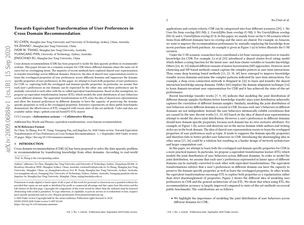Towards Equivalent Transformation of User Preferences in Cross Domain Recommendation

Cross domain recommendation (CDR) has been proposed to tackle the data sparsity problem in recommender systems. This paper focuses on a common scenario for CDR where different domains share the same set of users but no overlapping items...
The majority of recent methods have explored shared-user representation to transfer knowledge across different domains. However, the idea of shared-user representation resorts to learn the overlapped properties of user preferences across different domains and suppresses the domain-specific properties of user preferences. In this paper, we attempt to learn both properties of user preferences for CDR, i.e. capturing both the overlapped and domain-specific properties. In particular, we assume that each user’s preferences in one domain can be expressed by the other one, and these preferences can be mutually converted to each other with the so-called equivalent transformations. Based on this assumption, we propose an equivalent transformation learner (ETL) which models the joint distribution of user behaviors across different domains. The equivalent transformations in ETL relax the idea of shared-user representation and allow the learned preferences in different domains to have the capacity of preserving the domain-specific properties as well as the overlapped properties. Extensive experiments on three public benchmarks demonstrate the effectiveness of ETL compared with recent state-of-the-art methods.